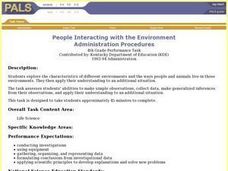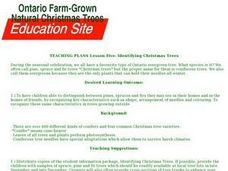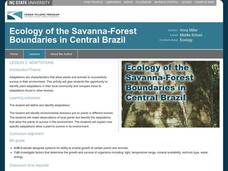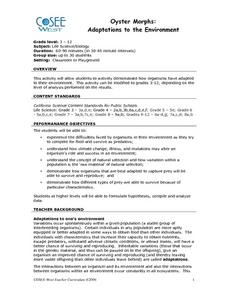Curated OER
Salinity Of Soil
Fourth graders investigate the contents of various types of soil to determine the differences in salinity levels. They conduct an experiment of observing the plants in the different soils. Students then determine survival rates by...
Curated OER
Introduction to Biomes
Eighth graders identify the different kinds of biomes. In this life science lesson, 8th graders explain their importance in an ecosystem. They take a BrainPop quiz at the end of the lesson..
Curated OER
Costa Rican Ecosystems
Students read about the Cloud Forests in Costa Rica and then answer critical thinking questions about how to prevent loss in this forest and how to slow down global warming.
Curated OER
People Interacting with the Environment
Students explore an arctic, temperate, and tropical environment and then decide what people need in each environment to help them live comfortably and what their lives would be like.
Curated OER
Independence and Conservation
Students read an original story "Brothers of the Rainforest" downloaded from the internet site provided. Students investigate the impact of the demise of a particular species on the rest of the environment. Students participate in a...
K12 Reader
Location, Location, Location
Why do some places in the world have more people living there than other places? Learn about the ways the countries have formed around natural resources with a reading comprehension activity. After kids read a short passage, they answer...
American Museum of Natural History
What is Marine Biology?
A marine environment covers the majority of the earth but is arguably the least understood. Teach young scientists about the characteristics of oceans and ocean species using an interactive online lesson. The in-person or remote learning...
Virginia Department of Education
Evidence of Evolution
What an impression fossils make! In this activity, aspiring paleontologists view fossils and construct a timeline to further understand how the lack of natural adaptation caused historical organisms to become extinct. While they should...
PACER Center
The Peer Advocacy Guide
Teasing, mocking, and disrespect can be the hallmarks in the life of those with disabilities. Disrupt the cycle of abuse with a toolkit designed to turn peers into advocates for all those who are bullied. Everything needed to create a...
NOAA
Please Pass the Salt
Salinity is the focus of two experimenters that work to answer the question, How does salt change the physical properties of water? Super scientists compare the freezing rate of salt and fresh water, combine the two waters to observe how...
Curated OER
Lesson Five: Identifying Christmas Trees
Stuudents distinguish between pines, spruces and firs they may see in their homes, by recognizing key characteristics such as shape, arrangement of needles and colouring. They recognize these same characteristics in trees growing outside.
Curated OER
Vacancy: Habitats Available!
Sixth graders pick a native animal and write a classified housing ad to match the animal's habitat requirements, paste it on posterboard and then try to match each habitat with the animal it represents.
Curated OER
Birds and Coffee
Fifth graders identify the changing seasons with how they affect animal and human behavior. They explain what migration is and why many birds migrate south for the winter. They then trace the coffee sold in their neighborhood and in...
Curated OER
Adaptations
Sixth graders identify plant adaptations. In this adaptations lesson, 6th graders use digital cameras to photograph plants found on their campus. Students describe the adaptations for each plant.
Curated OER
Oyster Morphs: Adaptations to the Environment
Students demonstrate how organisms adapt to their environment. They examine prey and predators, natural selection, and adaptations by representing oyster morph.
Curated OER
The Important Role of Biomes
Travel the world from the comfort of your classroom with this unit on the Earth's biomes.
Curated OER
The Desert Alphabet Book
Students explore world geography by researching a science book with their classmates. In this desert identification lesson, students utilize a U.S. map to locate the geographical locations of deserts. Students create an oral report based...
Curated OER
Migrate, Adapt, or Hibernate
In this migration and hibernation worksheet, learners read a 2 page informational excerpt about animals who adapt to changing seasons by migrating or hibernating. They then use the information they learned to answer the 15 questions on...
Curated OER
World Tourism Day
In this World Tourism Day worksheet, learners complete activities such as read the passage, match the phrases, fill in the blanks, choose the correct word, multiple choice fill in, correct the spelling, put text in correct order,...
Curated OER
Mini-Ecosystems
Students use plastic bottles to create terrariums and plant Venus Flytraps. They observe the plants and the terrariums for illustrations of the water cycle and species' adaptations to a specific environment.
Curated OER
Opening Doors to Social Studies with Children's Literature: The Desert Alphabet Book
Students explore the geography of the United States. In this social studies lesson, students identify the major deserts on a map of the United States.
Curated OER
Ecology 8 Land Biomes
Pupils identify and describe the main features of one land biome. After researching what a biome is, they give various examples of biomes around the world and in their backyards.
Curated OER
Verterbrate Classification
Students are introduced to the broad categories of vertebrates including fish, amphibians, reptiles, birds and mammals. They identify the characteristics of each group and then view slideshows and video of example species.
Curated OER
The Extraordinary Life of the Alaskan Tundra
Young scholars investigate the characteristics of the tundra on the North Slope of Alaska. They conduct Internet research, develop a chart of the types of vegetation, plant growth, and fauna found on the tundra, identify examples in...

























